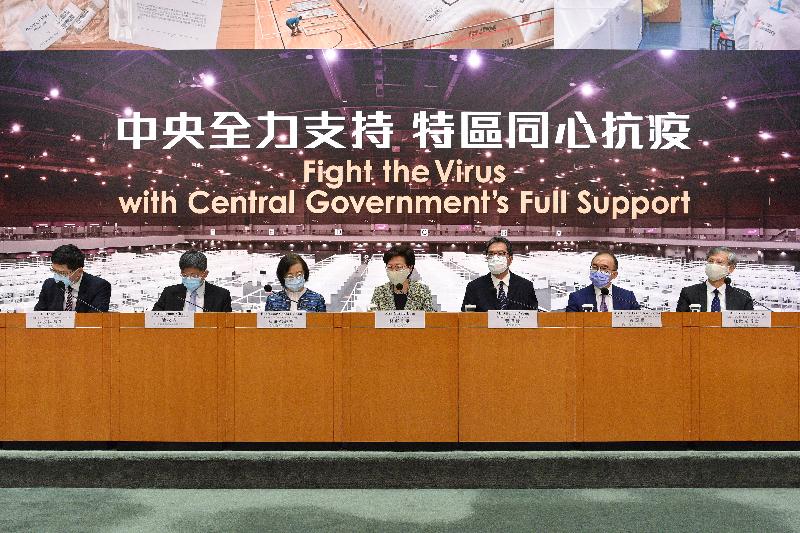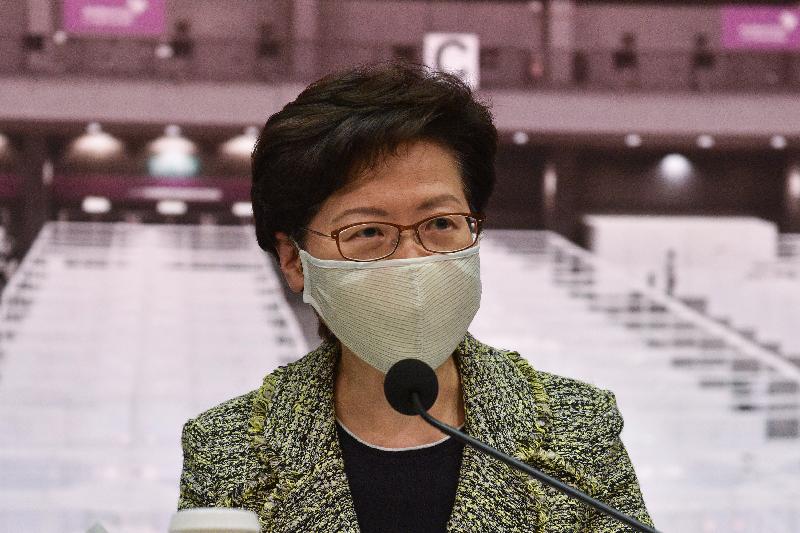Transcript of remarks of press conference (with photos/video)
The Chief Executive, Mrs Carrie Lam, held a press conference today (August 7). Also joining were the Secretary for Labour and Welfare, Dr Law Chi-kwong; the Secretary for Food and Health, Professor Sophia Chan; the Secretary for Development, Mr Michael Wong; the Secretary for Constitutional and Mainland Affairs, Mr Erick Tsang Kwok-wai; the Permanent Secretary for Food and Health (Health), Mr Thomas Chan; and the Chief Executive of the Hospital Authority (HA), Dr Tony Ko. Following is the transcript of remarks of the press conference.
Reporter: First of all, given this universal city-wide test that you are trying to do, can you first talk about how exactly do you think it'll help if it's not mandatory? And have you already derived a comprehensive system to tackle a surge in the number of confirmed cases because you estimate that there are gonna be 1 500 people who are potentially walking around in Hong Kong and you are looking at the number of beds at AsiaWorld-Expo (AWE) and Lei Yue Mun isolation facilities, right now we don't have the ability to cope with the surge in number of cases? And my second question is on your comment that there have been a lot of rumours, rumour-mongering and smearing. Are you only specifically referring to comments or criticism that Hongkongers' DNA could be sent over to the Mainland? And with regards to this point, can you detail on how will the information collected be handled, given the privacy concerns and just once and for all, allay concerns over how Hongkongers don't have to be worried about having their personal information being sent over, whether its specific personal information or big data information? Third question is about the exemptions for lab workers from across the border. Specifically the exemptions that you're planning on giving them is with regards to the qualifications, so how do you expect people to have trust in the system if you're giving exemptions to the qualifications required for this type of work here in Hong Kong? Thank you.
Chief Executive: I will invite the Secretary for Food and Health to address the third question because she is the statutory authority for granting exemptions but let me just stress that these personnel coming to help us boost the testing capacity are not unqualified people. Please don't misunderstand they are unqualified people to do medical laboratory tests and we are making them qualified – no, they are qualified in the Mainland system but they want to operate in accordance with the Hong Kong legal system. Our law does provide for the exemption for certain categories of people. I will leave Sophia to answer that question.
As far as your first question, this is exactly what I said at the beginning. We actually have not worked out all the details that you want to have, but because of the spreading and circulating rumours, I consider it necessary to come out and dispel any misunderstanding in the first instance, otherwise people will be misled by those rumours circulating on the social media. I try to allay the fears and concerns by laying out the five important principles that we will abide by in arranging this universal community testing, but on a voluntary basis. If people still have concerns, they don't need to come forward. This is an entirely voluntary programme to provide testing for those who want to have a test, either to find out whether they are infected or they just want to be more sure that they are safe in that sense.
Of the important principles, if I need to rehearse them in English, one is we want to do it as soon as possible within a short duration because the earlier that we could identify these "silent transmitters" the better, and this is a free service. The second principle is we have to observe the social distancing measures. I could not allow thousands of Hong Kong people queuing up and crowding in front of a desk to await their turn to have a swab, for example, so that is the second principle – how we could avoid this queuing and crowd gathering in order to administer the test. The third is to provide as much convenience as possible for the people of Hong Kong to pick up their specimen bottle and also to return it. And we will use electronic means as far as possible. The fourth principle is it has to be a very safe process, that is, we will try to separate the collection points from the distribution points. In one place you will not have the same people dealing with the distribution and the same people dealing with the collection of specimen bottles and we are devising a way to actually track the specimen bottle. Finally, most importantly, is to protect personal data. I explained that this protection has gone all the way to the extent that the laboratories will not be given any personal information. They are only given the specimen bottles for them to conduct tests on the specimen and then to tell the Department of Health of the specimen coming in bottles which are the ones that are found to be positive. And how do we identify those positive? It's not done by the laboratory. It's done by the Department of Health through the barcode – the code number. This is exactly what we are doing now with the elderly care centres' staff. The laboratory actually does not know who is "that confirmed case" in "which nursing home". The laboratory does not know. They just tell, I think, the Social Welfare Department, "This particular code number in this particular specimen is tested positive, so please find out that home and that person yourself." I hope this is very reassuring. Without the personal information, what's the point of taking all these specimen and saliva and so on? That's my response.
You mentioned about whether we could cope through the community universal testing if we really discover over 1 000, maybe 1 500 cases. Could we cope? I think we could because this will not come in day one. You just imagine, discounting the last four days, for 12 consecutive days, we have over 100 daily, one day is close to 150. 150 times 14 is how many…… is 1 700 already. I think together with the AWE, HA facility and the AWE Fang Cang facility to be developed by the Mainland team, we should be able to cope with that sort of surge as a result of the universal community testing. I will invite the Secretary to answer the question about exemptions.
Secretary for Food and Health: Regarding the National team of medical laboratory technologists coming to Hong Kong, first of all, they are accredited. They are a team accredited by the National Health Commission (NHC), so the exemption will be made by the Secretary for Food and Health under Section 29 (1A) of the Supplementary Medical Professions Ordinance (Cap 359).
As I have said earlier, this team is accredited by the NHC. And also, they are experienced group of people who have done tests of COVID-19 in the laboratories in the Mainland. These specified persons are the members of the national accredited laboratory testing personnel arranged by the NHC to conduct specified tests in Hong Kong for the Government, within a specified period which is two months.
(Please also refer to the Chinese portion of the transcript.)

